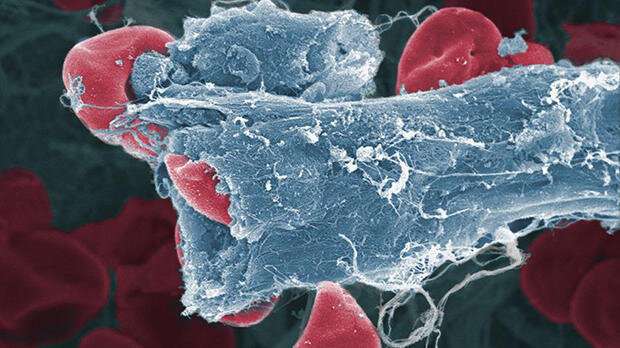
The National Institute for Health and Care Excellence (NICE) has approved the drug brentuximab vedotin to treat some adults with a rare type of fast-growing lymphoma.
Clinical trial data suggests that combining the targeted treatment with chemotherapy could give people with systemic anaplastic large cell lymphoma more time before their disease progresses and help them live longer.
The drug combo will now be available on the NHS in England as a first treatment option for patients with this type of blood cancer.
Emlyn Samuel, head of policy development at Cancer Research UK, said the decision would be “very welcome” for people affected by this disease.
Combination therapy
Brentuximab is a type of monoclonal antibody that sticks to a molecule on the surface of lymphoma cells, delivering the drug directly to the cancer.
Brentuximab vedotin is given in combination with the chemotherapy drugs cyclophosphamide and doxorubicin and the steroid prednisone. Using brentuximab vedotin to target lymphoma could help improve the effectiveness of the combined chemotherapy drugs.
Clinical trials
Current standard of care for this group of patients a combination of chemotherapy drugs—cyclophosphamide, doxorubicin, vincristine—and prednisone.
Clinical trials showed the brentuximab combination can give patients more time before their disease gets significantly worse compared to existing therapies, and may help them live longer.
In one study, patients on brentuximab and chemotherapy were almost twice as likely to survive beyond the 5-year evaluation period than patients on existing chemotherapy treatments.
Patients told NICE the therapy resulted in reduced side effects, offering a better quality of life. And as the brentuximab combination can be given as an outpatient rather than inpatient treatment, the new option will minimize the impact on everyday life.
Approved
NICE found the additional benefits to patients of the brentuximab vedotin combination meant it offered value for money for the NHS when combined with the chemotherapy drugs.
Following a discount to the drug’s price agreed between its manufacturer and NHS England, NICE concluded that the combination was a cost-effective use of NHS resources, approving it for use in England.
NICE decisions are usually adopted in Wales and Northern Ireland as well as England, so the decision is likely to affect patients in all three nations. Scotland has a separate process for reviewing which drugs should be available on the NHS.
NICE estimates that there are approximately 273 patients with this type of blood cancer in England, and around 191 patients would be eligible for this therapy.
Source: Read Full Article
